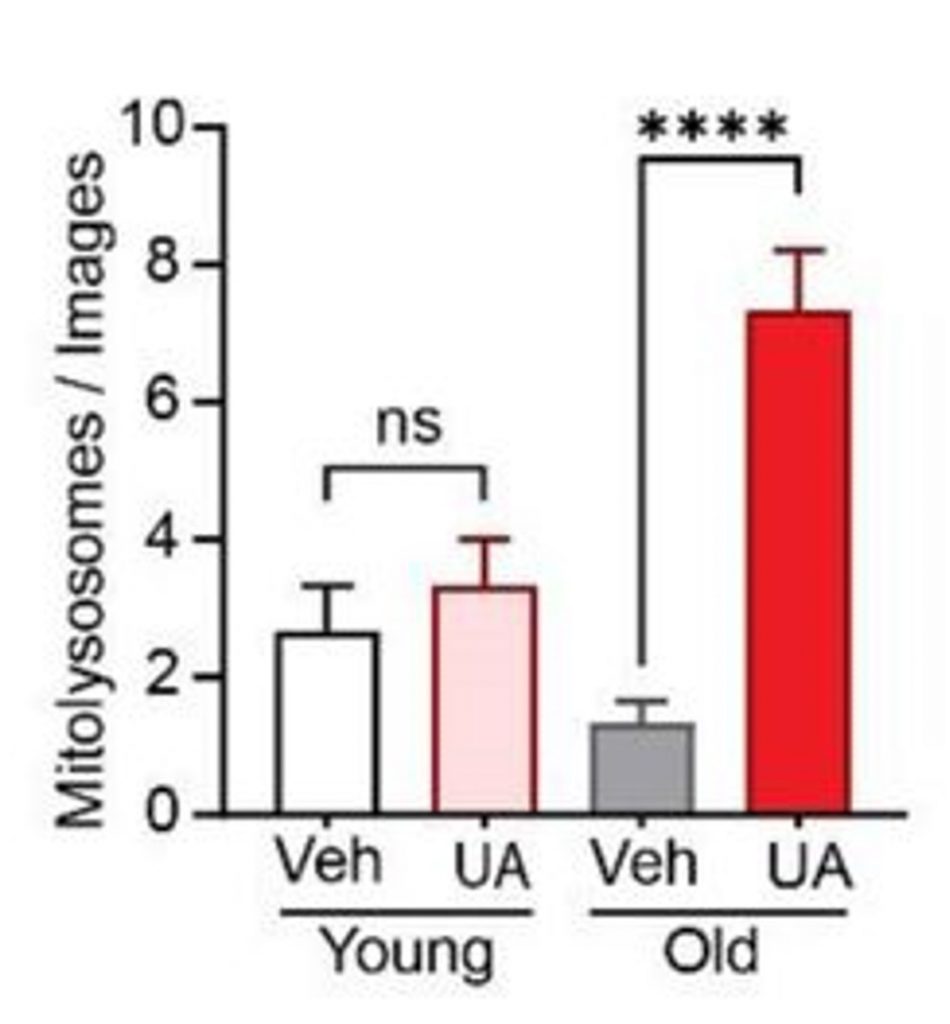Key Points:
- Feeding aged mice urolithin A (UA) prevents the decline of the heart’s blood-pumping action.
- UA maintains the muscle strength of aging mice.
- Treating aged mice with UA boosts mitophagy beyond normal levels within the heart.
Several factors propel the aging process forward, including damaged mitochondria — the structures that generate energy for our cells. Broken and poorly functioning mitochondria are usually destroyed by our cells through a process called mitophagy. However, the mitophagy process declines with age, making mitophagy inducers like UA exemplary anti-aging agents.
Now, in a pre-print (not yet peer-reviewed) publication from BioRXiv researchers from the University of Washington, Amazentis in Switzerland, and collaborators throughout Europe show that UA protects against heart and muscle aging in mice. The authors conclude,
“Together with previous results from clinical trials demonstrating improved muscle function, these data point to UA supplementation as a tool to enhance healthy aging and quality of life in older adults and call for clinical studies validating the impact of UA on cardiac function in humans.”
Urolithin A Pauses Heart and Muscle Aging
To test the anti-aging effects of UA on the heart, Liu and colleagues measured the heart’s ejection fraction — the volume of blood pumped out of the heart per beat — from aged mice. They then fed the mice normal food or food supplemented with 50 mg/kg/day of UA for 2 months. While the ejection fraction of the mice fed a normal diet declined over 2 months, the ejection fraction of the UA-treated mice increased. This means that UA could counter the functional decline of the heart associated with aging.

Like the heart, our muscles consume a great deal of energy and are particularly susceptible to the functional deterioration associated with aging, especially mitochondrial damage. To determine whether UA preserves muscle function with age, Liu and colleagues measured muscle strength. They found that muscle strength declined in mice fed a normal diet but increased for mice fed UA. These findings suggest that UA protects against muscle decline.

In another set of experiments conducted in Europe, aged mice were administered 50 mg/mL of UA by oral gavage (force-feeding). The hearts of these mice were then examined for mitophagy, which was measured by counting the number of mitolysosomes — structures that destroy mitochondria. UA nearly quadrupled mitolysosome numbers, showing beyond normal levels of mitophagy.
“The mitolysosome structures in the aged UA-treated mice significantly overshot those in the young and young UA-treated hearts, suggesting that UA does not just enhance mitophagy, but boosts the sensitivity of the mitophagic system to respond to poorly functioning mitochondria,” the authors note.

Anti-Aging Effects of UA in Humans
The findings of Liu and colleagues suggest that UA protects the heart and muscles from functional decline by boosting mitophagy. Furthermore, human studies have shown that UA improves muscle strength and exercise endurance in overweight adults and counteracts age-associated muscle decline. From this, it seems feasible that UA supplementation counters muscle aging in humans.
While our gut bacteria naturally produce UA, only 30% to 40% of adults have the correct gut bacteria composition to do so. Furthermore, while UA is in foods like pomegranates, it is difficult to achieve high levels of UA through dietary intake alone. UA supplements can be purchased at $2.66 to $4.16 per 500 mg dose.